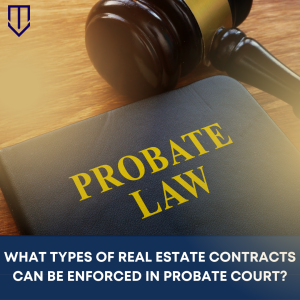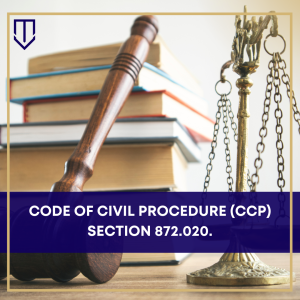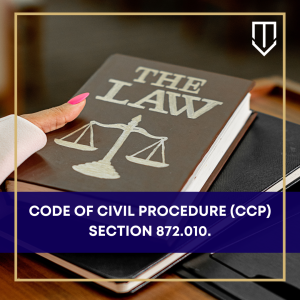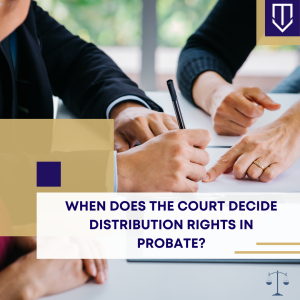 Real estate contracts are an expansive field of both law and life. Sales, leases, options, and certainly wills can all fall under this broad category. Normally, once a contract is signed, parties can go to court to enforce them by filing a lawsuit. But if one of the parties has passed away, the transaction becomes more complicated.
Real estate contracts are an expansive field of both law and life. Sales, leases, options, and certainly wills can all fall under this broad category. Normally, once a contract is signed, parties can go to court to enforce them by filing a lawsuit. But if one of the parties has passed away, the transaction becomes more complicated.
Thankfully, the California legislature created Probate Code section 850 to remedy some of the problems inherent to these situations. No longer do separate lawsuits need to be filed. Instead, interested parties can file a special petition to get the probate court to enforce a contract concerning the subject property. For instance, a son could petition to enforce a contract with his decedent’s mother where she had promised to transfer him the house upon death.
That said, the law surrounding these petitions is still dense and unwieldy for inexperienced litigants. As such, securing the right attorney in these situations can make all the difference. At the Underwood Law Firm, our attorneys are well-versed in these matters and are ready to assist. Potential litigants should not hesitate to contact our office so that we can begin making your goals a reality.
 Yes. California law allows a co-owner to take out a mortgage without the other co-owners consent or knowledge.
Yes. California law allows a co-owner to take out a mortgage without the other co-owners consent or knowledge.  California Partition Law Blog
California Partition Law Blog


 California Code of Civil Procedure section 872.020 is under Title 10.5 Partition of Real and Personal Property. This statute details the scope, or in other words, the
California Code of Civil Procedure section 872.020 is under Title 10.5 Partition of Real and Personal Property. This statute details the scope, or in other words, the  The
The  In every property co-owned by two or more persons, there are common costs. Common costs are those costs for the property that are common to all owners or for the common benefit of all owners. In California, cotenants are required to pay for their portion of the common costs. Therefore, cotenants must pay for their share of expenses to operate and maintain the property. The portion of common costs one must pay depends on the ownership interest of that cotenant.
In every property co-owned by two or more persons, there are common costs. Common costs are those costs for the property that are common to all owners or for the common benefit of all owners. In California, cotenants are required to pay for their portion of the common costs. Therefore, cotenants must pay for their share of expenses to operate and maintain the property. The portion of common costs one must pay depends on the ownership interest of that cotenant. When a person passes away and leaves behind the property, their property must first pass through the probate process before being passed down to family members and loved ones. Essentially, the probate process is a legal process that determines the execution of the estate of someone who has passed away. Moreover, during the probate process, the court appoints an executor or an administrator to administer the deceased’s estate. Therefore, probate property refers to any assets or property left behind by a deceased person that passes through the probate process.
When a person passes away and leaves behind the property, their property must first pass through the probate process before being passed down to family members and loved ones. Essentially, the probate process is a legal process that determines the execution of the estate of someone who has passed away. Moreover, during the probate process, the court appoints an executor or an administrator to administer the deceased’s estate. Therefore, probate property refers to any assets or property left behind by a deceased person that passes through the probate process.  For family members of a deceased loved one, the most important part of probate proceedings is the final distribution of the estate. This occurs once the estate’s debts and obligations have been satisfied, and it serves to more or less end the probate of the estate.
For family members of a deceased loved one, the most important part of probate proceedings is the final distribution of the estate. This occurs once the estate’s debts and obligations have been satisfied, and it serves to more or less end the probate of the estate.  Yes, although the tenant is not allowed to exclude the non-consenting owners. The reason for this is grounded in ancient legal doctrine regarding the “right to possession” that all co-owners of property share together. Each owner may exercise this right, and each may grant it to a third party, should they so choose, even without the consent of the other owners.
Yes, although the tenant is not allowed to exclude the non-consenting owners. The reason for this is grounded in ancient legal doctrine regarding the “right to possession” that all co-owners of property share together. Each owner may exercise this right, and each may grant it to a third party, should they so choose, even without the consent of the other owners.  While it may not be obvious, a sizeable portion of the work that real estate agents and realtors do is court-ordered. Real estate law is a massive field, and often, the disposition of litigation results in the court forcing the sale of a property, be it a business, home, condominium, etc. As such, many realtors find themselves acting as agents or referees for parties to a lawsuit.
While it may not be obvious, a sizeable portion of the work that real estate agents and realtors do is court-ordered. Real estate law is a massive field, and often, the disposition of litigation results in the court forcing the sale of a property, be it a business, home, condominium, etc. As such, many realtors find themselves acting as agents or referees for parties to a lawsuit.  Real estate contracts are an expansive field of both law and life.
Real estate contracts are an expansive field of both law and life.  In California, a real estate investment trust is “any unincorporated association or trust formed to engage in business and managed by, or under the direction of, one or more trustees for the benefit of the holders or owners of transferable shares of beneficial interest in the trust estate and (1) that formed for the purpose of engaging in business as a real estate investment trust under the Federal Internal Revenue Code, (2) the sale of the shares of which has been qualified at any time by the Commissioner of Business Oversight pursuant to the Corporate Securities Law of 1968, and (3) that in good faith has commenced business as a real estate investment trust.” (Cal. Corp. Code
In California, a real estate investment trust is “any unincorporated association or trust formed to engage in business and managed by, or under the direction of, one or more trustees for the benefit of the holders or owners of transferable shares of beneficial interest in the trust estate and (1) that formed for the purpose of engaging in business as a real estate investment trust under the Federal Internal Revenue Code, (2) the sale of the shares of which has been qualified at any time by the Commissioner of Business Oversight pursuant to the Corporate Securities Law of 1968, and (3) that in good faith has commenced business as a real estate investment trust.” (Cal. Corp. Code